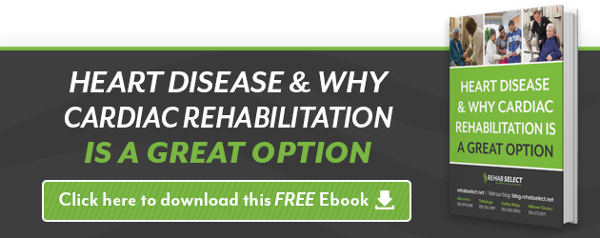
Men and women who have COPD are two to three time more likely to have cardiovascular disease than the general population. When COPD and heart disease exist together, each impacts the outcome of the other and increases your risk of death.
Some of the same risk factors associated with COPD are also linked to cardiovascular disease, such as smoking. The effects of COPD itself also impact your chances of developing heart disease. The heart and lungs are so inextricably linked; it’s easy to see how the conditions tend to influence each other.
To understand the heart/lung relationship, let's take a look at how the cardio-respiratory system works.
COPD: Heart Disease – What's the Connection?
The link between heart disease, congestive heart failure and COPD is strong. The heart and lungs are the vital organs that make up the cardio-respiratory system, which delivers oxygen and removes waste from the body. The lungs and heart exchange gases during this continual process.
When you inhale, your lungs take in oxygen and deliver the molecules to the bloodstream, which circulate through the heart and get delivered to the tissues of the body to keep you alive. The carbon dioxide that your cells produce as waste takes that ride in reverse, heading up through the heart and out of the body through the lungs.
It’s easy to see how the heart and lungs are both so closely linked that factors that impact one can cause repercussions to the other. Now that we have a better idea of how the heart and lungs work together let’s take a closer look at exactly how COPD impacts the heart.
What Are the Cardiac Consequences of Long Term COPD?
COPD is marked by damage to your lung tissue: the worse the damage, the more progressed the disease. As the condition worsens, the risk of death increases.
Some of the underlying mechanisms that lead to heart damage and strain include lung hyperinflation, inflammation, COPD exacerbations, and hypoxia:
-
Lung hyperinflation
: air gets trapped in the lungs causing over-inflation, which can compress and thereby damage the heart -
Inflammation
: swelling and irritation from smoking and lung damage can cause heart damage -
COPD exacerbation
: a flare-up can amplify the effects of COPD and heart damage -
Hypoxia
: lack of oxygen can lead to atherosclerosis and thereby cardiovascular disease
Congestive Heart Failure and COPD
The American Heart Association (AHA) notes that severe lung diseases, which include COPD, are among the conditions that can lead to heart failure
When lung tissue is damaged, the heart has to work harder to keep up with the body’s need for oxygen. This increased strain on the heart can eventually lead to congestive heart failure.
Congestive heart failure is a long-term condition that happens when your heart can’t pump blood well enough to give your body a normal supply. Blood and fluids collect in your lungs and legs over time, making breathing even more difficult.
This creates a vicious cycle of strain and damage to both the heart and the lungs.
In addition to the effects that COPD has on the heart, the two conditions also share some common risk factors that link them together.
Shared Risk Factors
Some of the same risk factors that increase your chances of developing COPD also boost your chances of developing heart disease. It’s not uncommon to develop one alongside the other.
Smoking
Smoking causes up to 90% of COPD cases and makes you 2-4 times more likely to get heart disease. Smoking puts you at significant risk for both conditions as it damages both the heart and the lungs.
Age
Accelerated aging is a risk factor for both COPD and heart disease, mostly in men and women over 65. As cell turnover rate in the lungs and arteries decline and telomeres (segments of DNA) shorten, the function of the heart and lungs also decreases, making you susceptible to both conditions.
Physical Inactivity
Leading a sedentary lifestyle negatively influences your heart and lung health. The organs don’t function as well when they’re not conditioned. If you’re not active, you’re also more likely to experience COPD exacerbation, hospitalizations, and severe complications. In fact, having both congestive heart failure and COPD is associated with a higher risk of death for patients.
Now that we’ve identified this strong relationship between COPD and cardiac problems, you might be wondering how to manage your risk.
How to Manage Heart Disease and COPD Risk
If you or a loved one has COPD, you and your healthcare providers can do a lot to prevent or manage heart disease risk:
Prevention
First, it’s essential to screen anyone with COPD for heart disease, since the conditions so commonly exist hand-in-hand. Early recognition and prevention are important for the best possible outcomes of all patients, especially those with congestive heart failure and COPD.
If your doctor hasn’t mentioned it already, ask them about heart disease testing at your next appointment. If your doctor requests a CT scan for your lungs, for example, he or she can check for calcium buildup in the lungs at the same time. Also, make sure to report any new or lingering COPD and heart disease symptoms you experience.
If you don’t have heart disease already, you can still do a lot to prevent its onset by controlling your blood pressure and cholesterol, exercising, eating right, and limiting factors that exacerbate your condition.
Specialized Care for Cardiac Patients
If you do have heart disease, look for rehab programs that provide integrated care in both the cardiac and pulmonary specialties. Facilities that specialize in COPD and heart disease, such as Rehab Select, can better coordinate specialized care for coexisting conditions.
More severe cases may require inpatient rehabilitation. If you have a COPD-related event, you may undergo comprehensive pulmonary rehabilitation and cardiac rehab using clinically-effective therapies to help you recover.
Your specialists set you up with the most effective medications, therapies, and treatment regimens to manage your conditions going forward.
Lifestyle Modifications
You can make some lifestyle modifications to significantly improve your condition, including smoking cessation and physical activity. Quitting smoking is one of the best things you can do for your heart and lungs (and the rest of your body). Physical activity also helps condition your heart and lungs to operate at max function.
Education
The more you know about COPD and heart disease, the more prepared you’ll feel going forward. You’ll learn how to take control of your health and improve your quality of life. Don’t hesitate to ask your doctor lots of questions and do some research on your own.
You can start today by reading through the Heart Disease ebook. Our guide gives you insight into the causes, effects, prevention, and treatment of heart disease.
COPD: Heart Disease – Get Rehab Support in Alabama
At Rehab Select, we provide five cardiac rehab locations in Alabama with a personalized, physician-led program to improve your heart health and quality of life. We’re here to answer all your questions, including:
- What are the cardiac consequences of long term COPD?
- How can you best manage your heart condition with healthy strategies?
- How can you reduce the risk of another cardiac event?
The more you know about COPD and heart disease, the more prepared you’ll be to take charge of your health. Learn more about our options for cardiac rehabilitation and pulmonary rehabilitation in Alabama. We’re here to help and would love to talk or give you a tour.





